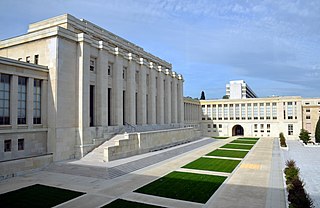
Jamaica has diplomatic relations with many nations and is a member of the United Nations and the Organization of American States. Jamaica chairs the Working Group on smaller Economies.

The United Nations Economic and Social Council is one of the six principal organs of the United Nations, responsible for coordinating the economic and social fields of the organization, specifically in regards to the fifteen specialised agencies, the eight functional commissions, and the five regional commissions under its jurisdiction.

Asia-Pacific Economic Cooperation is an inter-governmental forum for 21 member economies in the Pacific Rim that promotes free trade throughout the Asia-Pacific region. Following the success of ASEAN's series of post-ministerial conferences launched in the mid-1980s, APEC started in 1989, in response to the growing interdependence of Asia-Pacific economies and the advent of regional trade blocs in other parts of the world; it aimed to establish new markets for agricultural products and raw materials beyond Europe. Headquartered in Singapore, APEC is recognized as one of the highest-level multilateral blocs and oldest forums in the Asia-Pacific region, and exerts significant global influence.
From 1916 to 1975, Tuvalu was part of the Gilbert and Ellice Islands colony of the United Kingdom. A referendum was held in 1974 to determine whether the Gilbert Islands and Ellice Islands should each have their own administration. As a consequence of the referendum, the separate British colonies of Kiribati and Tuvalu were formed. Tuvalu became fully independent as a sovereign state within the Commonwealth on 1 October 1978. On 5 September 2000, Tuvalu became the 189th member of the United Nations.

The economy of North America comprises more than 596 million people in its 24 sovereign states and 15 dependent territories. It is marked by a sharp division between the predominantly English speaking countries of Canada and the United States, which are among the wealthiest and most developed nations in the world, and countries of Central America and the Caribbean in the former Latin America that are less developed. Mexico and Caribbean nations of the Commonwealth of Nations are between the economic extremes of the development of North America.

The International Cospas-Sarsat Programme is a satellite-aided search and rescue (SAR) initiative. It is organized as a treaty-based, nonprofit, intergovernmental, humanitarian cooperative of 45 nations and agencies. It is dedicated to detecting and locating emergency locator radio beacons activated by persons, aircraft or vessels in distress, and forwarding this alert information to authorities that can take action for rescue. Member countries support the distribution of distress alerts using a constellation of around 65 satellites orbiting the Earth which carry transponders and signal processors capable of locating an emergency beacon anywhere on Earth transmitting on the Cospas-Sarsat frequency of 406 MHz.

The Space & Upper Atmosphere Research Commission, commonly referred to as SUPARCO, is the independent agency of the Government of Pakistan responsible for the national civilian space program.

The following outline is provided as an overview of and topical guide to Armenia:

The following outline is provided as an overview and topical guide to Singapore:

An international organization, also known as an intergovernmental organization or an international institution, is an organization that is established by a treaty, or is an instrument governed by international law and possessing its own legal personality, such as the United Nations, the World Health Organization, International Union for Conservation of Nature, and NATO. International organizations are composed of primarily member states, but may also include other entities, such as other international organizations, firms, and nongovernmental organizations. Additionally, entities may hold observer status. An alternative definition is that an international organization is a stable set of norms and rules meant to govern the behavior of states and other actors in the international system.
Canada-Asia relations are relations between Canada and Asian countries. These include bilateral relations between Canada and individual Asian states and multilateral relations through groups such as Asia-Pacific Economic Cooperation.
The Global Forum on Migration and Development (GFMD) is a state-led, informal and non-binding process, which helps shape the global debate on migration and development. It provides a flexible, multi-stakeholder space where governments can discuss the multi-dimensional aspects, opportunities and challenges related to migration, development, and the link between these two areas. The GFMD process allows governments - in partnership with civil society, the private sector, the UN system, and other relevant stakeholders – to analyze and discuss sensitive issues, create consensus, pose innovative solutions, and share policy and practices.
The Committee for the Coordination of Statistical Activities (CCSA) is composed of international and supranational organisations whose mandate includes the provision of statistics. The CCSA promotes inter-agency coordination and cooperation on statistical programmes and consistency in statistical practices and development.
The following is a list of international organizations in which the Philippines officially participates.
 ASEAN — dialogue partner
ASEAN — dialogue partner  Council of Europe (observer)
Council of Europe (observer) International Atomic Energy Agency
International Atomic Energy Agency  North Atlantic Treaty Organization (NATO)
North Atlantic Treaty Organization (NATO) Order of Malta
Order of Malta  Organization for Security and Co-operation in Europe (OSCE)
Organization for Security and Co-operation in Europe (OSCE) Organization of American States (OAS)
Organization of American States (OAS) Pacific Islands Forum (partner)
Pacific Islands Forum (partner) UNESCO
UNESCO  World Trade Organization
World Trade Organization 








